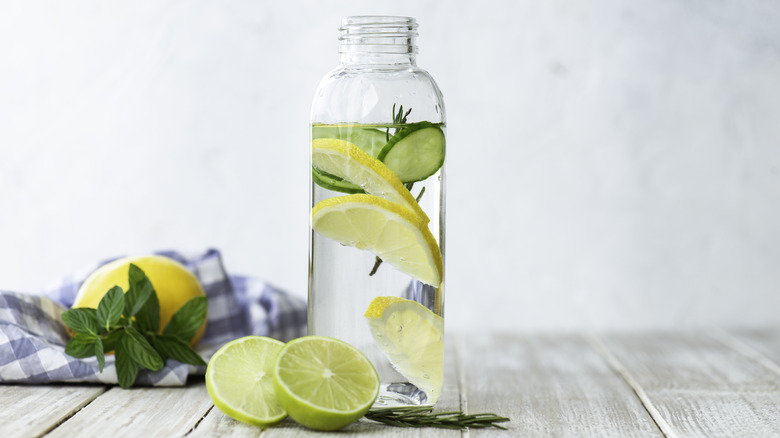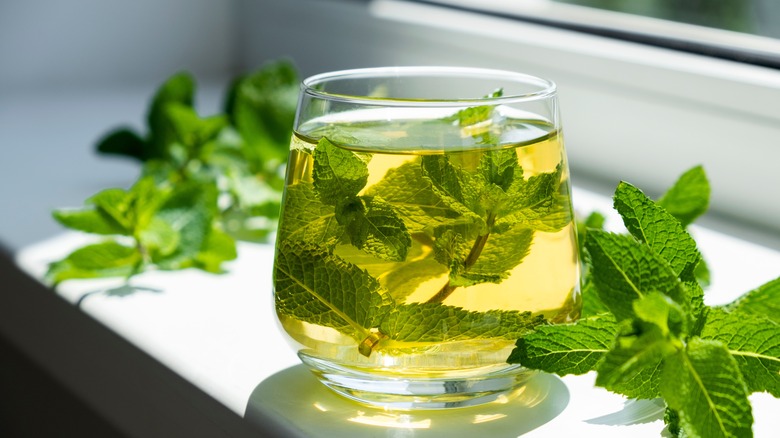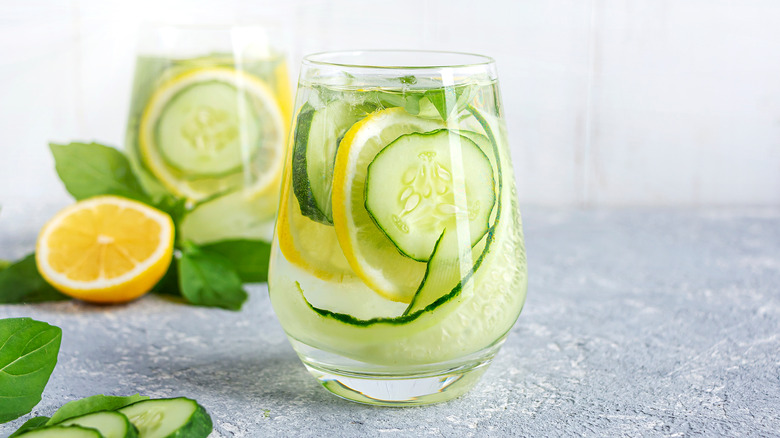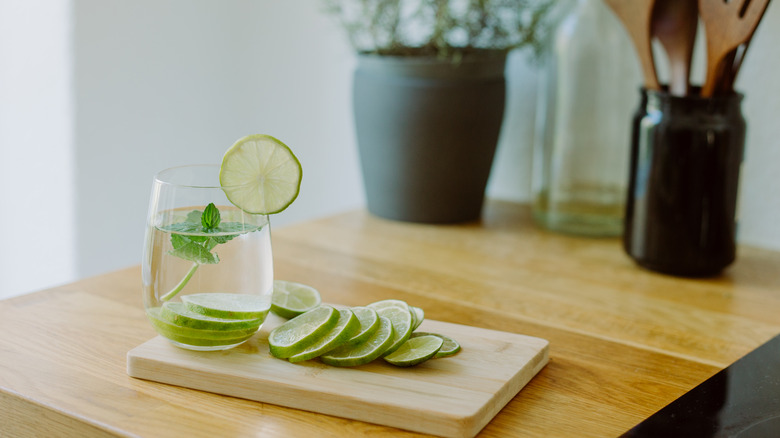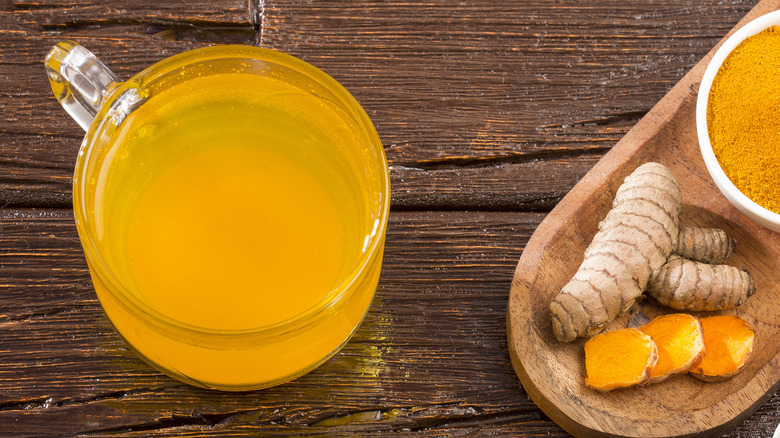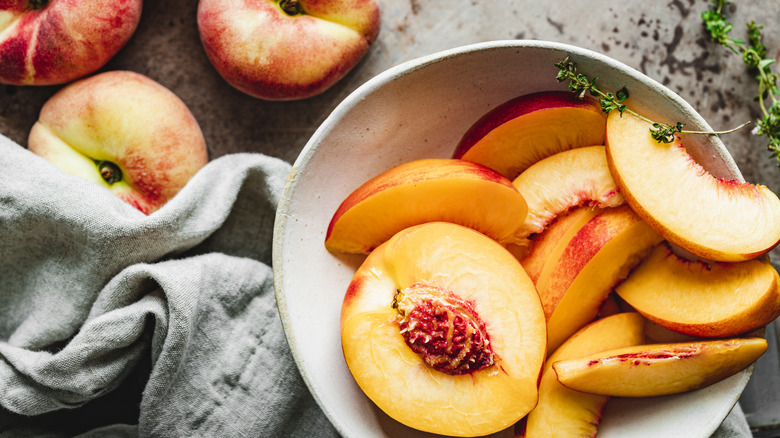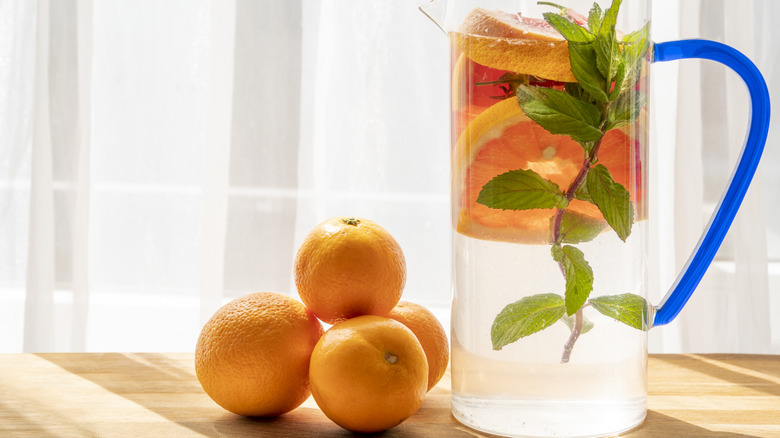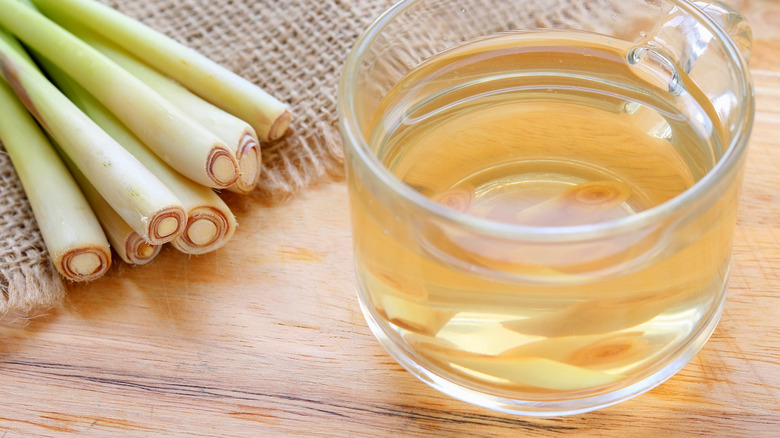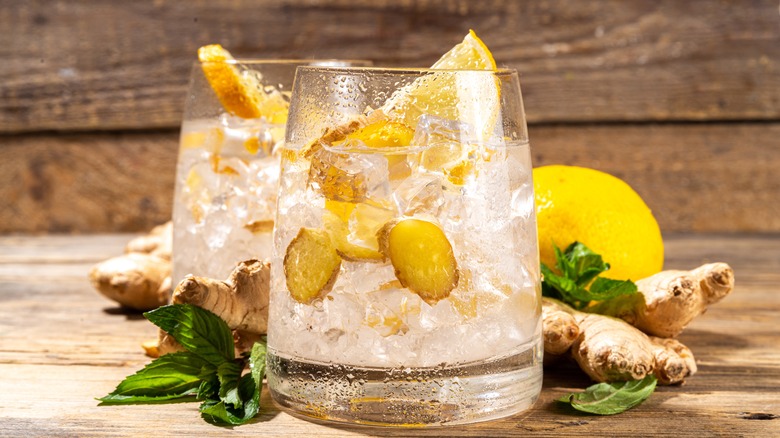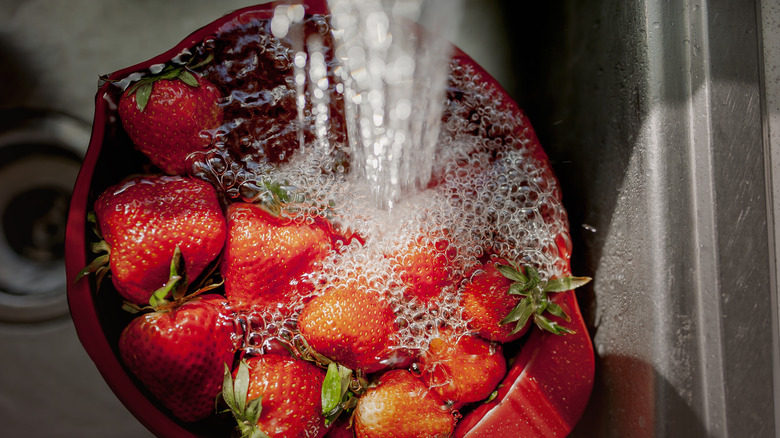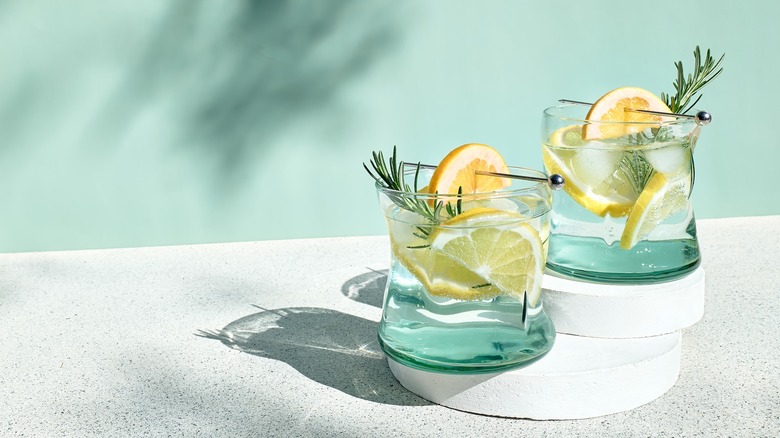13 Fresh Ingredients To Enhance Your Everyday Water
There's nothing more refreshing than an ice-cold glass of water, at least for most people. The real reason cold water tastes better than warm water is because the temperature helps to suppress the flavor of impurities. There is, however, a segment of the population that struggles to drink their suggested eight glasses of even cold water per day. Iced coffee and soda count, right? Wrong. Water is not only important to human bodily function, but it's also essential. Staying hydrated helps to regulate body temperature, keep joints lubricated, filter waste, and protect your spinal cord. And water does it best. Without it, you would die, but not everyone loves that crisp and refreshing emptiness of flavor that comes along with water. Luckily, there are plenty of fresh ingredients to enhance your everyday water that is not only delicious but important for your system. Goodbye diet Pepsi and caramel macchiatos, hello hydration.
Water is by far the most beneficial drink for human beings, but that doesn't mean we can't add a little flair in the flavor department. The best way to enhance boring old water is to add natural ingredients to it, like fruit, vegetables, or herbs, which can be incredibly flavorful and refreshing. The nutrients from natural vegetation infuse water with vitamins and minerals, and let's face it, every sip will feel like you're swaddled up in fresh white towels at the spa. Treat yourself with ice-cold, naturally-infused water.
Lemon
Okay, this one is a no-brainer. Who hasn't had a glass of lemon water at a restaurant at least a few times in their lives? Unless you have an aversion or allergy to the fruit, it's highly unlikely you've scathed by without having lemon water be a consistent beverage in your life. However, if you don't often drink water, it may have been a while since you've tasted this tangy yet refreshing drink. If your water just tastes off, add a spritz of lemon to help mask or neutralize the flavor. Lemon is quite intense with both sweet and sour flavors, and just a little bit will make a difference.
There are many types of lemons out there, some sweeter than others, like the Amalfi lemon, or intensely aromatic, like a Meyer lemon, but most likely you'll find a basic Lisbon lemon at your grocery store. However, it's more than just about the flavor when it comes to this citrus fruit. And if all else fails and lemon water just isn't your thing, try adding a little honey to sweeten things up, as the two pair famously together.
Mint
There's a reason that we almost exclusively use mint in toothpaste. It's refreshing, spicy, and strong, and can make your breath smell uber-fresh. However, it's good for more than just oral hygiene. Mint is an important herb used in both sweet and savory culinary creations, especially alongside robust meats and vegetables. It's also a popular addition to cocktails, and non-alcoholic drinks alike. In fact, simply adding mint to your water can give it a major facelift.
First, decide what type of mint you enjoy best. You can base this on the type of gum you typically purchase. Some distinctions are subtle; like between mint and peppermint, what's the difference? Peppermint is more intense because it contains more menthol, and spearmint has a more subtle, sweet flavor. There are two ways you can add mint to your water. The first is by simply massaging the leaves between your fingers before dropping them in water overnight, refrigerated, of course. By morning, the water should be minty fresh. You can also muddle mint leaves into water for faster results. Do this using a mortar and pestle, or by crushing the leaves with a muddler right into your water.
Cucumber
If you've had the pleasure of enjoying a relaxing day at the spa, then you know that enjoying a crisp glass of cucumber water is an essential part of the experience. Yes, the fresh white bathrobes, eucalyptus steam room, and warm oil massages are all part of the overall vibe, but after a long day of relaxation, there's nothing quite as refreshing as cucumber water. And, hey, you can always add to the experience by slapping a few of those cucumber slices on your eyes, as well.
Although they are made up of mostly water, cucumbers are loaded with vitamins. They are brain food but also aid with kidney and joint function. Cucumbers have a delicate floral flavor to them and are mildly sweet and salty, which makes them the perfect fresh ingredient to enhance your everyday water. Because they are crisp and refreshing, they can help make any glass of water sing. But how long can cucumbers sit in water for maximum infusion? Let your sliced cucumbers sit in cold water in the refrigerator for one to two hours. The longer it infuses, the stronger the flavor. Mix cucumber with lemon, mint, or other herbs and citrus flavors. It's mild enough that its flavors will remain subtle, and it can handle complementary ingredients. Make everyday spa day.
Lime
Another classic, along with adding lemon juice to water, is lime juice. And although the two citrus fruits have some similarities, their flavor and applications are typically quite different. In a pickle, they have been known to act as a sufficient substitute for each other, but there are some major differences you should know about. Besides their difference in color, lemons tend to be described as sour, while limes are more bitter. Lemons have a more distinct sweetness to them, while lime sugars are more subtle. Both are acidic, but because of their differences, recipes tend to call for one or the other. When selecting one to enhance your water, it's all up to personal preference.
If you typically use lemon in your water, give lime juice a try. There are different types of limes, like key limes and Persian limes, which all have subtle flavor variations. Persian limes are the most common in the United States and tend to be larger. Key limes are more aromatic and floral, and can sometimes be slightly tarter and more intense as well. This is why they are used for key lime pie which has a strong and distinctive lime flavor. Squeeze a little of either of these types of limes into your water for a fresh, bitter, acidic, and slightly sweet punch of flavor.
Turmeric
You may know turmeric as that yellow powdered superfood that is found in Indian cooking, golden milk lattes, and sometimes earthy-crunchy dressings, soups, and sauces. However, before it is processed into a spice, turmeric is a root that looks quite a bit like ginger. Besides appearance, the difference between fresh and dried turmeric has mostly to do with flavor. Fresh turmeric tastes citrusy, and fresh, but is often accompanied by honey to help balance its flavor. Dried turmeric tends to have a more earthy flavor and doesn't dissolve well in cold water, although it's less likely to make a mess. If you're working with fresh turmeric, just be sure to wear gloves, and an apron, and cover any surfaces that could stain. It's bright yellow, and anything it comes in contact with will be, too.
Turmeric is quite popular because of its antioxidant content and anti-cancer properties because of the active ingredient curcumin. You can even intensify the effects of curcumin by pairing turmeric with black pepper. Not only will fresh turmeric give your boring old water a colorful shine, but you can also rest assured you're doing something powerful for your body.
Peach
For those who enjoy sweet drinks, but are trying to avoid too many refined sugars, consider adding peach slices or fresh peach juice to your water. Stone fruits tend to have a honey-like aroma and flavor, and are often less tart than other types of fruit. Peaches, in particular, are quite floral with a subtle tartness. When selecting ripe peaches look for vibrant colors, and slightly soft flesh when pressed. The riper the peach, the sweeter the flavor.
Once you have selected your bounty and they've become ripe, the absolute best way to keep peaches fresh is to store them in your refrigerator. Reserve the countertop for unripe fruit that still has a little way to go. To infuse water, slice your peaches right over the pitcher. This will ensure you catch any juicy drips, but be careful to protect your fingers. Let the peach slices sit in refrigerated water for a few hours, and enjoy. Alternatively, you can juice fresh peaches and add them to water. Unlike lemons or limes, you can add quite a bit of juice without having to risk it being overpowering.
Orange
Although nothing rhymes with orange, plenty of flavors pair well with the brightly colored fruit. If lemon water or lime water just seems a little too tart or sour for your palate, try a sweeter citrus fruit. Oranges can be freshly squeezed and enjoyed as a juice or can make for a subtle yet distinctive flavor enhancer for fresh water. Because it can be enjoyed on its own as juice, you are welcome to add as much orange as you'd like to your water without creating an overpowering flavor. Use freshly squeezed orange juice, or infuse your water with orange slides.
There are many types of oranges to choose from, and all can be used to enhance your water. Navel oranges are popular because they are easy to peel, and Blood oranges vary in color from deep orange to purple, usually with a bit of red in the mix. Minneola tangelos, which are a cross between a tangerine and mandarin orange are deep orange, extremely juicy, and much sweeter than your typical orange. Choose your favorite, let a slice or two float in your glass, or go ahead and squeeze some juice right in.
Lemongrass
Many of us in the United States aren't used to using fresh lemongrass in our cooking, let alone in our drinks. You may have tasted it before in a Thai-based coconut soup or curry, or in a light and citrusy tea. If this is your first experience with the woody stick-like plant, then it's essential that you understand what lemongrass is, so you can use it properly. Unlike most herbs, you're not going to want to chomp into this one, as it's quite fibrous. It tastes similar to ginger, with a citrusy flair that almost carries a hint of basil.
To infuse your water with lemongrass, simply remove its outer layers and grate or slice the inner layers. If you plan to grate it, you may want to strain the fibrous plant once the water is served. If you plan on letting the slices of lemongrass float in the water, just be sure not to get a mouthful of them when sipping. Instead, let them steep for an hour or two before removing them, leaving refreshing and uniquely flavored water.
Basil
Although often associated with pesto and pizza, basil is a rather sweet and spicy herb that is often paired with fruits and vegetables alike. In fact, basil can be found in a plethora of mixed drinks, often alongside strawberries or citrus, so it's no wonder that basil makes an incredible flavor addition to ice water. Luckily, basil is rather accessible in the U.S., and is a common herb that people grow in their gardens, on their porches, or even in their kitchens.
To infuse water with basil, simply crush it between your fingertips and let it sit in a refrigerated pitcher of water for a few hours, or muddle it right into the glass. Use fresh, tender basil that has been washed thoroughly. If you're planning to enjoy basil water all week long, it's essential to keep the herb perky and fresh. The best way to keep basil fresh is to let it sit in a container with its stems in water either by your windowsill or in the refrigerator. Garnish your glass of water with a fresh basil leaf, and a slice of strawberry. This tasteful combination is not only beautiful but delicious and will be sure to impress any house guest.
Ginger
If you're ready to transform your water-drinking experience and bring it to a whole new level then you must try adding ginger root. Yes, you've probably heard of the combination of lemon, ginger, and honey in your hot tea or boiling water. But ginger makes a great addition to ice water as well, and is flavorful enough to fly solo. Consider buying fresh ginger and either juicing it, slicing it, or grating it to get the most flavor you can from the oddly shaped root. The simplest way to add fresh ginger to a drink is by grating it right in.
Ginger skin is edible, but it's a good idea to peel it before taking it to the grater. Use a fine cheese grater, like one for Parmesan cheese, or a zester to break the root down into as small of pieces as you can to release the juices. Ginger can help to relieve nausea and is fantastic for your digestive system. There's a reason that ginger ale is suggested for those with stomach upset, this is just a much healthier way to get ginger into your system than with soda. Ginger is intense and spicy, so start by just adding a few splashes to your water before including a full tablespoon.
Strawberries
When it comes to infusing water with berries, strawberries are a great pick. They tend to not be terribly tart, but instead mellow and sweet. Therefore, they make a fantastic addition to water for those who are used to indulging in sweet drinks but would prefer something a little more natural. Infuse water by letting sliced strawberries sit in your glass or pitcher, or use strawberry tops to infuse drinks. That's right, don't let those little green tops go to waste. They make a beautiful garnish and are entirely edible for those who dare to try them.
In addition to infusing your ice water with strawberries, save a slice or two for around the rim. Strawberries pair well with lime, lemon, basil, oranges, and pineapple. If you'd prefer a stronger flavor, juice strawberries with a blender and cheesecloth, or use a juicer before adding the liquid to your water. You can also freeze strawberry chunks or juice into ice cubes, and add them to plain water so that the flavor intensifies as the cubes melt. The berry-fresh flavor is a crowd-pleaser, just be sure to use organic berries and give those little red jewels a good wash before using them for water infusion.
Rosemary
For those that enjoy a nice botanical flavor in their cocktails, give rosemary-infused ice water a try. Not only is the herb extremely aromatic, but it's also quite beautiful and can add a sophisticated aesthetic appeal. In fact, when a sprig of rosemary is added to a cocktail, much of the time it's done so that the drinker will smell the herb as they sip their drink, adding to the overall experience. The addition of rosemary to cocktails boosts the herbaceous flavors and aromatics, and the same goes for water.
Simply place one sprig of fresh rosemary in your ice water glass and let your senses do the rest. It has a sage-like flavor, with a slightly citrusy mint undertone. If you're looking for an herby-fruity combination, add a slice of pear or apple to your rosemary water. And it's not all about the flavor and aesthetic, as rosemary can also improve memory, help with muscle spasms, and work wonders for your circulatory and nervous systems. If a sprig of rosemary is too intense for you, make rosemary syrup by boiling the herb in water with sugar or honey, let it cool, and add that to your ice water.
Grapefruit
As it turns out, grapefruit is actually a hybrid of two popular citrus fruits. It's what stemmed from the love affair between a sweet orange and a pomelo, creating a pink, tangy, and sweet fruit of its own. Some folks enjoy drinking its juice or enjoy its pulp straight, while others can only stomach the tangy citrus if it's broiled or coated with brown sugar or maple syrup. It has a tart flavor, with a bitterness similar to but less intense than limes. However, it's also loaded with sweet sugars and can be incredibly juicy.
Red grapefruits, which are the sweetest type of grapefruit, are preferable for most people. But if you're interested in adding a little tanginess to your water then explore different varieties like the white grapefruit. Squeeze a whole half into your glass of water, or simply add a few slices for a more mellow infusion. Grapefruit tastes particularly delectable with herbs like mint, basil, or rosemary, so consider mixing and matching it to flavor your everyday water. In addition, keep in mind that grapefruit can dull the effects of some medications, per the FDA, so it's important to check with your healthcare provider if you plan to infuse your water with grapefruit juice and take a prescription. For everyone else, enjoy grapefruit juice-infused water all year round.
